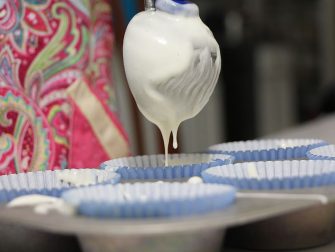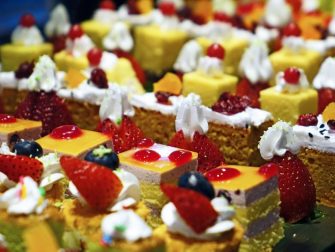Have you ever stopped mid-bite, savoring that perfect piece of cake, and wondered why this particular flavor, this specific texture, speaks to you so deeply? It turns out, there’s a fascinating layer of psychology baked into our preferences! While your favorite cake might not be a crystal ball into your soul, emerging research suggests our choices are intertwined with our personality, experiences, emotions, and even our social interactions. Let’s slice into the delicious science behind what your go-to cake might reveal about you.
Taste, Temperament, and the ‘Sweet’ Side of Personality
It often feels intuitive – people who love sweet things seem, well, sweeter! Interestingly, science is beginning to back this up. Research suggests a correlation between a preference for sweet tastes and what psychologists call ‘prosocial’ traits – think agreeableness, friendliness, and helpfulness. This isn’t just a stereotype; studies have explored the fascinating link between taste perception and social behavior. One particularly compelling study in Scientific Reports found that participants who tasted something sweet were subsequently more generous when asked to share money with a stranger compared to those who tasted salty or neutral flavors. It seems experiencing sweetness can genuinely nudge us towards kinder actions, perhaps by easing the brain’s internal conflict when deciding whether to act selfishly or generously.
Why would sweetness have this effect? One idea comes from ’embodied metaphor theory,’ which explores how abstract concepts like kindness can be linked to physical sensations like sweetness (think of common phrases like calling someone ‘sweetheart’). This connection might be rooted in early experiences, like the comfort of sweet milk during infancy. Evolution might also play a role; sweet tastes signal energy-rich food, potentially fostering a general ‘approach’ behavior that extends to social interactions. So, if your heart sings for a classic vanilla bean sponge, a generously frosted carrot cake, or a simple, comforting pound cake, it might just reflect an underlying inclination towards harmony, connection, and seeing the good in others. These cakes often symbolize celebration and comfort, mirroring a personality that values warmth and positive relationships.
Of course, the world of cake is far richer and more diverse than just ‘sweet’. What about those who crave different profiles? If you find yourself drawn to cakes bursting with fruit – think tangy lemon drizzle, vibrant berry tarts, or apple crumble cake – research hints this might align with personality traits like openness to experience, extroversion, and conscientiousness. These individuals might be more adventurous, sociable, and organized, appreciating the freshness and zest that fruit brings. Their cake choice could reflect a desire for brightness and perhaps a slightly more health-conscious approach to indulgence.
And what about the lovers of deep, rich, intense flavors? A large population-based survey noted gender differences in preferences, with men often leaning towards richer, savory foods. Could this translate to cake? Perhaps those who adore decadent chocolate fudge cake, dense, creamy cheesecake, or a boozy black forest gateau possess personalities that seek bold, substantial experiences and aren’t afraid of intensity. Conversely, preferences for cakes with more complex, perhaps slightly bitter notes, like those featuring dark chocolate or coffee, might indicate an appreciation for nuance and depth, potentially aligning with findings that women often favor high-cocoa dark chocolate. And let’s not forget the thrill-seekers! A preference for cakes with unexpected spicy twists, like chili-chocolate or ginger-infused creations, could tap into the sensation-seeking trait identified in those who enjoy spicy foods in general. While research specifically on cake texture is still developing, it’s easy to imagine how preferences for light-and-airy versus dense-and-fudgy could also reflect different personality facets.
How Experience and Environment Bake Our Preferences
Our cake preferences aren’t simply born; they’re often baked over time, heavily influenced by our upbringing and the world around us. As psychological research highlights, learning plays a massive role in shaping what we like. Think back to your childhood: What cakes were served at birthdays? What treats did your parents offer as rewards? Parents act as gatekeepers, introducing us to specific flavors and textures and reinforcing preferences, sometimes unconsciously, through praise or association with happy events. That nostalgic pull you feel towards a specific type of cake might be a direct result of these early, positive learning experiences.
Beyond the family table, our social circles and cultural backgrounds leave their mark. We learn by observing others; seeing friends enjoy a particular cake or noticing a specific type trending on social media can subtly sway our own desires. The psychology behind our food choices acknowledges this powerful social influence. Family traditions often dictate celebratory cakes, embedding certain flavors deep within our sense of occasion. Furthermore, psychologists are discovering how lasting impressions from early life, such as childhood socioeconomic factors or experiences with food scarcity, can shape adult eating habits, potentially influencing whether cake is viewed primarily as a rare indulgence or a readily available comfort. Even the way a cake is presented or marketed – as decadent, wholesome, or trendy – can influence our perception and desire for it. Cultural norms also dictate what’s considered a ‘typical’ or desirable cake, adding another layer to our personal preferences.
The Emotional Slice: Comfort, Cravings, and Choices
Let’s be honest, sometimes cake is more than just dessert; it’s therapy. The concept of ‘comfort food’ is deeply relevant here. Our emotional state significantly impacts our cravings. Feeling stressed? Research suggests the stress hormone cortisol can increase appetite and cravings for high-calorie, sweet foods – hello, decadent chocolate cake! That rich slice might offer a momentary sense of relief or reward, making it an emotional go-to. Conversely, a lighter, fruitier cake might appeal more when we’re feeling upbeat and positive, reflecting a desire for something refreshing.
Our relationship with cake is also shaped by our thoughts and eating behaviors. A study published in Public Health Nutrition found links between higher sweet consumption and specific eating styles. ‘External eating’ – being prompted to eat by cues like sights and smells rather than actual hunger – was strongly associated with consuming more sweets. Are you easily tempted by a beautiful cake display or the aroma wafting from a bakery? That could indicate higher sensitivity to external cues. The study also linked ’emotional eating’, which means eating in response to feelings (especially negative ones), to higher sweet intake, particularly in women, suggesting cake can be a tool for managing emotions.
On the flip side, ‘restrained eating’ – the practice of consciously limiting certain foods for health or weight reasons – was linked to lower sweet consumption. If you tend to opt for less sweet cakes or naturally gravitate towards healthier alternatives, it might reflect a more controlled approach to eating. Our beliefs about specific cakes (‘luxurious’, ‘homemade’, ‘too rich’, ‘a healthier option’) also guide our choices, often stemming from learned associations or marketing messages. And don’t underestimate the power of memory; the taste of a specific cake can instantly transport us back to a cherished moment, solidifying its place in our hearts (and on our plates).
So, What Does Your Slice Really Say?
After exploring all these fascinating connections, it’s clear that deciphering the ‘meaning’ behind your favorite cake isn’t about finding a simple personality label. There’s no definitive test where ‘likes Red Velvet’ equals ‘is dramatic yet charming’ (though it’s fun to imagine!). Instead, our cake preferences are a rich tapestry woven from threads of our innate taste sensitivities, our learned experiences from childhood, the cultural messages we absorb, our emotional states, and our individual psychological tendencies towards things like comfort-seeking or novelty.
Understanding these influences doesn’t take the magic out of enjoying cake; if anything, it adds another layer of appreciation. It encourages a little self-reflection. Why do I always crave cheesecake when I’m stressed? What memory does that simple sponge cake evoke? Perhaps recognizing these patterns can help us practice more mindful eating, savoring each bite with greater awareness. This understanding allows us to make choices that align authentically with both our emotional needs and physical well-being. Ultimately, your favorite cake is part of your unique story. So, embrace your preference, whether it’s for the most elaborate gateau or the humblest cupcake, and enjoy the sweet journey of discovery – both in the world of baking and within yourself.



